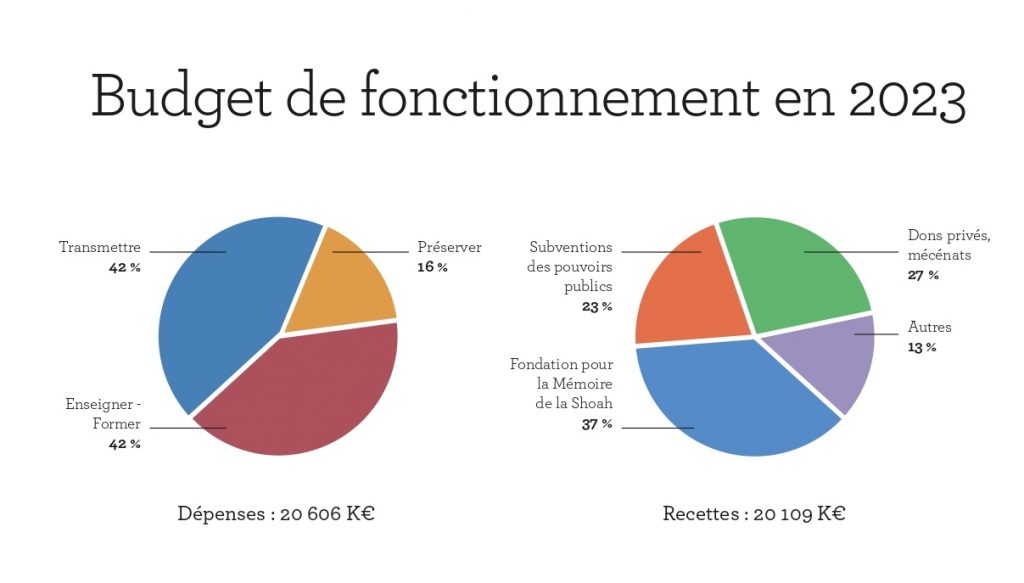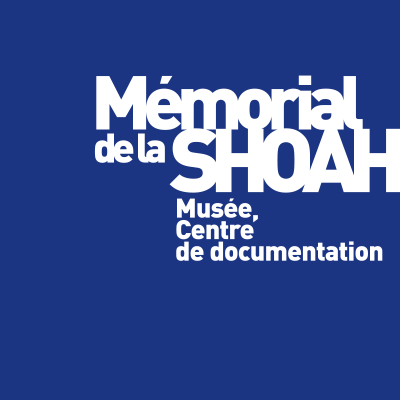The mission of the Shoah Memorial
The Shoah Memorial is active in the fields of research and documentation, publishing with the Review of History of the Shoah, of pedagogy, adult education and on the field of cultural mediation with the museum and cultural activities but also the valorization of places of memory.
Research and documentation
The Shoah Memorial houses a documentation centre divided into three departments: archives, library and photo library. This archive, made up of nearly 50 million documents, photos, books, archival films, posters, postcards and even objects is open to everyone, from the researcher to the student, who can come to consult archives on site in a unique space for information and transmission of knowledge about the Holocaust and, in particular, about the history of the Jews of France during the Second World War. Regularly enriched since the creation of the Centre for Contemporary Jewish Documentation in 1943 by donations and acquisitions of documents from witnesses of the Shoah, it constitutes a unique archive and an instrument of first order to study the destruction of the Jews of Europe.
Since January 2017, Mrs. Karen Taieb, head of the archives of the Shoah Memorial, has been a member of the scientific committee on the Second World War established by the National Archives in February 2016. The objective of this scientific committee is to ensure the application of the decree of 24 December 2015 concerning the opening of the archives of the Second World War; it brings together researchers and archivists and takes stock of the situation in the various archive centres.
The museum: Exhibitions and cultural activities
The Shoah Memorial Museum offers a permanent exhibition: a chronological and thematic journey consisting of twelve sequences that traces the history of the Jews of France during the Holocaust. This exhibition, based on the archives of the Documentation Centre, proposes a back-and-forth between individual history and collective history. In addition to this permanent exhibition, the museum presents each year temporary exhibitions that draw their themes from history, art and literature. They are open windows on the fate of the Jews in the other countries of Europe but also on the other genocides of the 20th century.
Educational activities and training actions
The Shoah Memorial leads of awareness actions towards the young audiences for several years. Faced with the worrying rise in racism and antisemitism, the Memorial wishes intensify his/her pedagogical activity and in particular carry this action beyond its walls. The educational offer has therefore been expanded and offers more inter-museum routes, training sessions in the provinces, educational workshops and delocalized exhibitions and trips to memory sites for school students, as well as a program adapted to the preparation of the CNRD. Since 2016, the History and Memories convention signed with the DILCRA allows to develop the actions of the Memorial for young people in order to reduce fears and hatreds.
The Memorial also hosts police officers just completed their training to complete their historical knowledge of the history of the Holocaust and the role of the police during this period.
Citizenship internships
As part of the development of alternative measures and penalties with educational value, the Memorial has established partnership agreements with the appeal courts of Paris, Lyon and Aix-en-Provence. In this context, it has developed a citizenship course for perpetrators of racist or anti-Semitic offences.
Learn more
Activities outside the walls
More than ever, the Shoah Memorial extends its activity and its work to prevent racism, antisemitism and genocide beyond its walls. Exhibitions, meetings, screenings, the province takes advantage of part of the Memorial’s programming in many cities and educational teams travel to lead workshops in institutions. Internationally, the Memorial also has some of its exhibitions on the road and organizes training activities and seminars for teachers and students in order to carry out preventive work against racism, hatred and genocide.
Learn more
Reception of the families of victims
The children, grandchildren and relatives of the victims of the Holocaust can be accompanied and helped in their search for information, whether it is to find a relative from the lists of Jews deported from France or to document a compensation claim. People wishing to provide information or give archives can also contact directly the Memorial which also travels to the provinces for archival collections.
Speaking group
The Shoah Memorial welcomes the Georges Devereux Center who organizes, one Sunday per month, a meeting of a group of former children hidden during the Holocaust.
This discussion group is led by the psychologists of the Georges Devereux Center, with the support of the Foundation for the Memory of the Shoah.
Upcoming appointments : Sundays, January 12, February 9, March 22, April 5, May 24 and June 14, 2020 from 2 PM to 5 PM (Free, without reservation)
Information:
Georges Devereux Center
Tel.: 01 77 32 10 64 or by email: contact@memorialdelashoah.org
Trips to places of memory
The Shoah Memorial organizes study trips to Auschwitz-Birkenau in Poland every year, open to all, both school groups and individuals. The Memorial also provides assistance and advice to set up, on request, projects towards all places of memory of the Shoah, in France and abroad.
The Network of places of memory of the Shoah in France
Since March 2015, the Network of places of memory of the Shoah in France brings together eleven institutions backed by a historical site and linked to the history and memory of persecution, deportation, extermination, the rescue or resistance of the Jews of France during the Second World War. Encouraging the development of links between its members, the Network aims to promote knowledge and transmission of the history of the Holocaust at both national and local levels, contributing to the affirmation of republican and democratic values, notably in the fight against all forms of racism and antisemitism. The Network relies in particular on young ambassadors of memory. Since 2010, the eleven institutions have met on the occasion of the Holocaust Remembrance and Prevention of Crimes against Humanity Day, on 27 January. In May 2017, Mont Valérien and the Deportation Martyrs Memorial joined the Network of Shoah Remembrance Sites which now has 13 partner institutions.
See the Network’s website
Scientific journal
The publication of the Revue d'histoire de la Shoah constitutes the emerging part of the research activity within the Memorial. Created in 1946, the Review deals with the history of the genocide of the Jews by Hitler’s Germany and the reflection it provokes in different cultural fields. She also opens her study to the other genocides of the 20th century. The editorial activity of the Memorial has extended to the publication of historical works for the general public in partnership with Calmann-Levy editions.
Operating budget
Many people and institutions support the Memorial in its mission, by contributing their know-how, expertise, time or even financial aid. May they all be warmly thanked.
Below is the operating budget extracted from the moral report of the Shoah Memorial.


